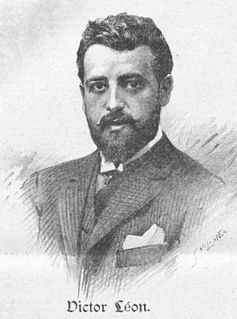
Johann Strauss II, also known as Johann Strauss Jr., the Younger, the Son, was an Austrian composer of light music, particularly dance music and operettas. He composed over 500 waltzes, polkas, quadrilles, and other types of dance music, as well as several operettas and a ballet. In his lifetime, he was known as "The Waltz King", and was largely responsible for the popularity of the waltz in Vienna during the 19th century. Some of Johann Strauss's most famous works include "The Blue Danube", "Kaiser-Walzer", "Tales from the Vienna Woods", and the "Tritsch-Tratsch-Polka". Among his operettas, Die Fledermaus and Der Zigeunerbaron are the best known.

Johann Strauss I was an Austrian Romantic composer. He was famous for his waltzes, and he popularized them alongside Joseph Lanner, thereby setting the foundations for his sons to carry on his musical dynasty. He is best known for his composition of the Radetzky March.

Maximilian Steiner was an Austrian actor and theater director and manager. He is known particularly for his leadership of Vienna's Theater an der Wien from 1869 to 1880, a period during which the theater reduced the importance of folk plays and was prominent in developing and promoting the fashion of a Viennese style of operetta.
Emmerich Kálmán was an Hungarian composer of operettas and a prominent figure in the development of Viennese operetta in the 20th century. Among his most popular works are Die Csárdásfürstin (1915) and Gräfin Mariza (1924). Influences on his compositional style include Hungarian folk music, the Viennese style of precursors such as Johann Strauss II and Franz Lehár, and, in his later works, American jazz. As a result of the Anschluss, Kálmán and his family fled to Paris and then to the United States. He eventually returned to Europe in 1949 and died in Paris in 1953.

Oscar Nathan Straus was a Viennese composer of operettas and film scores and songs. He also wrote about 500 cabaret songs, chamber music, and orchestral and choral works. His original name was actually Strauss, but for professional purposes he deliberately omitted the final 's', since he wished not to be associated with the musical Strauss family of Vienna. However, he did follow the advice of Johann Strauss II in 1898 about abandoning the prospective lure of writing waltzes for the more lucrative business of writing for the theatre.

Gräfin Mariza is an operetta in three acts composed by Hungarian composer Emmerich Kálmán, with a German libretto by Julius Brammer and Alfred Grünwald. It premiered in Vienna on 28 February 1924 at the Theater an der Wien.

Marinka is an operetta by Hungarian composer Emmerich Kálmán with book by George Marion, Jr. and Karl Farkas, and lyrics by George Marion, Jr. The operetta is a retelling of the story of the Mayerling Incident, but with a happy ending replacing the infamous 1889 double suicide of Austrian Crown Prince Rudolf and his mistress, Maria Vetsera. The best-known songs include "Only One Touch of Vienna," "Sigh by Night," "The Cab Song," and "When I Auditioned for the Harem of the Shah".

Henrietta "Jetty" Treffz was best known as the first wife of Johann Strauss II and a well-known mezzo-soprano appearing in England in 1849 to great acclaim.

The Gypsy Baron is an operetta in three acts by Johann Strauss II which premiered at the Theater an der Wien on 24 October 1885. Its libretto was by the author Ignaz Schnitzer and in turn was based on Sáffi by Mór Jókai. During the composer's lifetime, the operetta enjoyed great success, second only to the popularity of Die Fledermaus. The scoring and the nature of Strauss's music have also led many music critics to consider this work a comic opera or a lyric opera.
Neu Wien , opus 342, is a waltz written by Johann Strauss II in 1870 and dedicated to Nicolaus Dumba (1830-1900), who was a fervent patron of Arts and was the Chairman of the Wiener Männergesang-Verein and Vice-President of the Gesellschaft der Musikfreunde in Wien.

Hans Jakob Christoffel von Grimmelshausen was a German author. He is best known for his 1669 picaresque novel Simplicius Simplicissimus and the accompanying Simplician Scriptures series.

Waltzes from Vienna is a 1934 British biographical film directed by Alfred Hitchcock, sometimes known as Strauss' Great Waltz. It was part of the cycle of operetta films made in Britain during the 1930s.

Robert Elisabeth Stolz was an Austrian songwriter and conductor as well as a composer of operettas and film music.

Simplicius Simplicissimus is a picaresque novel of the lower Baroque style, written in 1668 by Hans Jakob Christoffel von Grimmelshausen and probably published the same year. Inspired by the events and horrors of the Thirty Years' War which devastated Germany from 1618 to 1648, it is regarded as the first adventure novel in the German language and the first German novel masterpiece.

Victor Léon, also Viktor Léon was a well-known Jewish Austrian-Hungarian librettist. He collaborated with Leo Stein to produce the libretto of Franz Lehár's romantic operetta The Merry Widow.
Vienna Waltzes is a ballet choreographed by George Balanchine to music by Johann Strauss II, Franz Lehár and Richard Strauss, made as a tribute to Austria. It premiered on June 23, 1977 at the New York State Theater, performed by the New York City Ballet, and was an immediate success among the public.

The Great Waltz is a 1972 American biographical musical film directed by Andrew L. Stone, and starring Horst Buchholz, Mary Costa, and Nigel Patrick, that follows 40 years in the life of composer Johann Strauss and his family. It is based on the musical The Great Waltz, and was Stone's final film. M-G-M released a previous film adaptation in 1938, which is about a different phase of the younger Strauss's life.

Paul Hörbiger was an Austrian theatre and film actor.

Alfred Jerger was an Austrian operatic bass-baritone, who began his career as a conductor of operettas, and was also an interim director of the Vienna State Opera and a professor of the Vienna Music Academy. He appeared at the Salzburg Festival from 1922 to 1959, and created the leading role of Mandryka in Arabella by Richard Strauss, among others.

Alexandrine von Schönerer née Lucia was an Austrian theater owner, managing director and actress.
















